Germaine Shames's Blog: Germaine Shames' Blog, page 5
February 18, 2012
Ballet Chooses the Dancer
My father was still recounting the story on his deathbed:
I was four years old, a wisp of a dancer in an itchy tutu, taking ballet classes with a teacher whom, my parents liked to boast, had studied under Martha Graham. Like other young girls, I dreamed of becoming a prima ballerina.
Martha Graham. Like other young girls, I dreamed of becoming a prima ballerina.
But I was not like most other girls. Shy, stubborn, I balked at following choreography and often found myself stranded alone on one side of the studio while the class, moving as one body, occupied the opposite side. And then suddenly, before I had mastered a single step, it was time for my first recital. A chorus line of us baby ballerinas was positioned center-stage as the towering velvet curtain slowly, slowly opened. One look at the audience and I froze, mouth wide-open, hands clamped to my cheeks.
My parents removed me from ballet class and enrolled me again thee years later—with similar results. There would be no more recitals. I moved on to other interests and other dreams, taking with me what little knowledge and grace I had managed to acquire.
Flash forward half a century…
I have ripened into, not a ballerina, but a writer with abiding creative and emotional ties to dance and dancers. My forthcoming novel, You, Fascinating You, the story of a forgotten ballerina who inspired a timeless love song, will be released within weeks.
Throughout the process of writing the book and preparing to launch it, I have been humbled again and again by the generosity of the ballet community. Russian danseur Stanislav Belyaevsky gifted me with the book’s exquisite cover image. Ballerinas Susan Jaffe, Janet Panetta, and Elana Altman read the book and offered cover blurbs, as did the granddaughter of the legendary Vaslav Nijinsky, Kinga Nijinsky Gaspers.
 This outpouring of goodwill has been both gratifying and bittersweet. What earthly Nirvana of camaraderie did I walk away from when I flung my leotard into a drawer and resigned myself to a lifetime of klutziness? Could I have tried harder?
This outpouring of goodwill has been both gratifying and bittersweet. What earthly Nirvana of camaraderie did I walk away from when I flung my leotard into a drawer and resigned myself to a lifetime of klutziness? Could I have tried harder?
The protagonist of my novel, Margit Wolf, begins the account of her life, “They say ballet chooses the dancer.” Regrettably, I was not among the chosen. How I envy those who are!

January 4, 2012
The Garden of the Finzi-Contini: Tennis, Longing and Doom
Vittorio De Sica’s award-winning film The Garden of the Finzi-Contini, recently restored and reissued, approaches the Holocaust from an oblique angle, stopping short of the barbed wire and chimneys strewing human ash. The film, largely faithful to the Giorgio Bassani novel from which it was adapted, has eclipsed the book for decades, yet the original is well worth reading, whether or not one has seen the film.
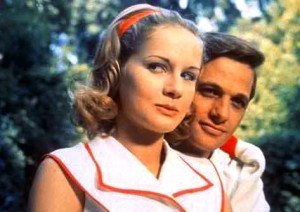 Bassani, writing autobiographically in the aftermath of the carnage, tells his story in the first person as if reliving the bittersweet years preceding the Finzi-Contini’s demise. A sympathetic narrator Giorgio is not. He portrays himself as no better or worse than the characters who surround him, a Jewish elite who are steadily losing their freedoms, livelihoods and dreams.
Bassani, writing autobiographically in the aftermath of the carnage, tells his story in the first person as if reliving the bittersweet years preceding the Finzi-Contini’s demise. A sympathetic narrator Giorgio is not. He portrays himself as no better or worse than the characters who surround him, a Jewish elite who are steadily losing their freedoms, livelihoods and dreams.
Although De Sica is best known as a Neo-Realist filmmaker, in The Garden of the Finzi Contini he lapses into the sort of soft-focus nostalgia common when chronicling a lost way of life. Bassani, too, in his lush yet distanced prose conveys a certain wistfulness, but ultimately the novel is a confession—of human pettiness, failure of spirit, and indelible guilt. The power of this confession does not quite hold in the film, however evocative the cinematography or convincing the performances.
Is there a place within the literature of the Holocaust for works like Bassani’s that intentionally remain on the fringe of the violence where there are neither heroes nor villains, only imperfect human beings lethally distracted by quotidian preoccupations? What do they have to teach us?
Bassani quotes from I promessi sposi, “The heart, to be sure, always has something to say about what is to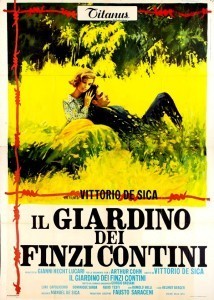 come, to him who heeds it. But what does the heart know? Only a little of what has already happened.”
come, to him who heeds it. But what does the heart know? Only a little of what has already happened.”
The author, unable to rectify the past, grapples in this thinly disguised memoir to enshrine its ghosts. Readers who come to The Garden of the Finzi-Contini looking for answers find instead a tormented plea for understanding by an imperfect man who survived, remembering those who did not.

November 7, 2011
The Power of Place and Time
There are stories that might have happened anywhere, anytime, and others that could only have happened at a historical juncture never to be repeated. You, Fascinating You falls into the latter category.
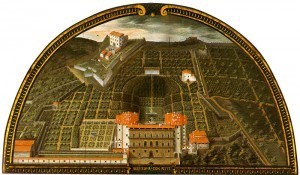
During the years I have spent reconstructing and preserving the story of my heroine, Margit Wolf, I have traveled through Hungary, Italy and Germany retracing her steps. The war she survived changed the face of Europe. And yet, inexplicably, small pockets within cities remained untouched. The city of Spandau, for example, where Margit was interned at a bomb factory, today stands intact exuding character and—dare I say?—charm. The Budapest Opera House where she learned to dance, only slightly damaged by Allied air raids, has regained its former splendor.
But it was Italy that Margit loved, Italy that drew her wide-eyed into a world of possibility. Her son Cesare still spends summers near Lake Como. How many hundreds of miles of autostrada did we drive, combing for stories?
On a recent visit to Florence, opposite the sprawling Palazzo Pitti, I happened to notice two small plaques, the first marking a modest flat where Fyodor Dostoevsky wrote The Idiot, and, nearby a similar flat where Carlo Levi wrote Christ Stopped in Eboli. The Russian author had fled to Italy to evade his creditors. His writings seem little influenced by his surroundings, though his window opened onto the ultimate treasure trove. In contrast, Levi, an Italian antifascist, returned home from Paris on the brink of the war only to be arrested and sent into exile in a southern backwater. And there divine justice intervened: Levi found beauty and dignity amidst the poverty and wrote what is, perhaps, the most penetrating of his works—a work steeped in place and time and never to be repeated.
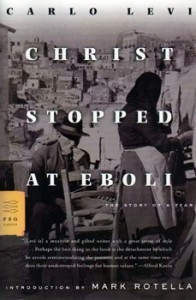 I cannot claim to have lived my heroine’s journey, only to have looked out at the same landscapes, awakened to the same church bells, watched the curtain rise in the same theaters… At moments, I thought I caught a glimpse of Margit herself, young and fearless and primed to soar. If only history had been kinder.
I cannot claim to have lived my heroine’s journey, only to have looked out at the same landscapes, awakened to the same church bells, watched the curtain rise in the same theaters… At moments, I thought I caught a glimpse of Margit herself, young and fearless and primed to soar. If only history had been kinder.

October 19, 2011
Colin Firth–Again?
Let me begin by saying, I have nothing against Colin Firth. By any measure, Firth is a fine actor and deserving of the recognition and success he has achieved. Unlike many other fine actors, he seldom appears in a slick or shallow film–in fact, he has starred in many of the films that have most moved me in recent years. Films like When Did You Last See Your Father?, A Single Man, and The King’s Speech.


Lately, it has begun to seem that every richly textured, character-driven film stars Colin Firth.
In each of these films Firth is entirely convincing, and yet I find myself wondering what slant or zing or chemistry another actor might bring to the role. For example, Viggo Mortensen. Viggo does not act but instead morphs into the characters he plays, and—why deny it?–-I love to see him naked. Or James McAvoy, whose performance in The Last Station not only rose to the level of Mirren and Plummer’s but served as a sort of metaphysical cartilage, subtly melding his fellow actors’ parts. Or Vincent Cassel, who’s so deliciously wicked and whose attitude could burst a black hole.
Perhaps I’ve just seen too much of Firth, or perhaps, because there seem to be fewer and fewer emotionally satisfying films produced each year, I seldom get to see my favorite actors play roles worthy of their talents.
A disillusioned film buff, I write the sort of stories I’d like to see acted. Stories rich in dilemma and desire, and that could one day find their way onto the Big Screen. When that day comes and a producer calls me to gloat, “Fab news, I’ve attached Colin Firth for the lead,” will I say, “C’mon, give someone else a chance?” Not likely. I’ll call my 94-year old aunt back East. I’ll call everyone I know.
Let me end by saying, I have nothing against Colin Firth.

October 4, 2011
Blogging From the Heart
Another blog? What can I, one more author wading into the waxing whirlpool of the blogosphere, possibly contribute that is different, magnetic, worthy of your time and mine? Let me begin by sharing the things that matter to me.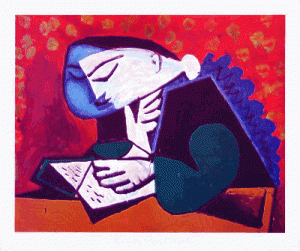
One would expect a writer to care about literature and storytelling, and I do—passionately. That said, I often find myself at odds with the literary establishment. Rather than indulge in rants and subliminal voodoo, I will share what excites me and ignore the rest.
I care about the Arts—visual, performing, and cinematic—and occasionally get paid to write on these topics. You will find references here to exhibitions, performances, and films that leave an emotional rash.
I love what remains of wildness in the world—forests, rivers, beaches, our undomesticated animal kindred, and starry night skies. Were I to list my peak experiences, the majority would involve close encounters with the hairy or feathered in pristine wilderness.
What won’t you find here? Having traveled large swaths of the globe and served as a correspondent, I care about world issues and social justice but am more likely to write about individuals quietly doing good than about geopolitics. I probably won’t write about celebrities unless they exhibit truly stupefying quirks or invite me home for a swim. And no, I can’t recommend the perfect cigar.
What I aim to deliver is a bouquet of controversies, a love affair with paradox, a manifesto to tenderness… cries and whispers you won’t hear on the news or read on a cereal box. To art! To the untamed and untrammeled! To you, savvy reader! Please stop by often and add your comments.

September 14, 2011
Why This Story and Not Another?
Reflecting later upon that meeting, I identified Cesare’s defining feature: regardless of where he made his home, he was unplaceable. He spoke with an accent, not Hungarian exactly, but not Italian either. Unlike his fellow émigrés, he had no wistful memories of Hungary, no desire to return.
I remember sharing a meal with him in a restaurant. There was something about the way he ate I had never before observed: although his table manners could not have been more refined, he appeared to be starving. Immediately upon finishing a course, he would signal the waitress and order a second helping—only to cancel the order moments later.
As we got to know each other, details of his childhood began to emerge—the malnutrition he suffered during World War II, the “shoes” he fashioned for himself from horses’ feedbags, the corpses alongside which he would awaken each morning… He seemed to be describing the perils of an orphaned waif abandoned to his fate, yet he was the son of Pasquale Frustaci (aka the “Italian Cole Porter”), a composer and conductor whose star, while the war cast Europe into darkness, had never shone brighter. How then, from the age of seven, did Cesare end up alone on the battlefronts of provincial Hungary in the midst of the worst carnage the world has known?
The answer would arrive in my mailbox fifteen years later: a videotaped oral history Cesare contributed to Yale University. It told the story of his mother Margit Wolf, a Jewish ballerina who fell in love with a dashing Italian maestro and bore him a son—a ballerina who inspired an international anthem to longing only to fade from history without a trace. I sat riveted, as if hearing the libretto of a classic ballet or opera, but this was memory—the memory of a hungry boy searching for his parents.
Why this story? Because it gripped my heart and would not let go. Because I lay awake nights thinking of Margit Wolf and hearing “You, Fascinating You” broadcast through my pillow. Because this is what great stories do: make us care.
August 22, 2011
Why this story and not another?
 To tell all the stories that transit my imagination, I would need a hundred lifetimes. My novels have each taken years to complete. You, Fascinating You has consumed fully one-tenth of my life. Its seed was planted more than twenty years ago, when I first met Cesare Frustaci.
To tell all the stories that transit my imagination, I would need a hundred lifetimes. My novels have each taken years to complete. You, Fascinating You has consumed fully one-tenth of my life. Its seed was planted more than twenty years ago, when I first met Cesare Frustaci.
Reflecting later upon that meeting, I identified Cesare’s defining feature: regardless of where he made his home he was unplaceable. He spoke with an accent, not Hungarian exactly, but not Italian either. Unlike his fellow émigrés, he had no wistful memories of Hungary, no desire to return.
I remember sharing a meal with him in a restaurant. There was something about the way he ate I had never before observed: although his table manners could not have been more refined, he appeared to be starving. Immediately upon finishing a course, he would signal the waitress and order a second helping—only to cancel the order moments later.
As we got to know each other, details of his childhood began to emerge—the malnutrition he suffered during World War II, the “shoes” he fashioned for himself from horses’ feedbags, the corpses alongside which he would awaken each morning… He seemed to be describing the perils of an orphaned waif abandoned to his fate, yet he was the son of Pasquale Frustaci (aka “the Italian Cole Porter”), a composer and conductor whose star, while the war cast Europe into darkness, had never shone brighter. How then, from the age of seven, did Cesare end up alone on the battlefronts of provincial Hungary in the midst of the worst carnage the world has known?
The answer would arrive in my mailbox fifteen years later: a videotaped oral history Cesare contributed to Yale University. It told the story of his mother Margit Wolf, a Jewish ballerina who fell in love with a dashing Italian maestro and bore him a son—a ballerina who inspired an international anthem to longing only to fade from history without a trace. I sat riveted, as if hearing the libretto of a classic ballet or opera, but this was memory—the memory of a hungry boy searching for his parents.
Why this story? Because it gripped my heart and would not let go. Because I lay awake nights thinking of Margit Wolf and hearing “You, Fascinating You” broadcast through my pillow. Because this is what great stories do: make us care.

June 8, 2011
More than Words
For decades, the whole of my writing career, in fact, I have had a running difference of opinion with the agents and editors responsible for taking my words to market. I believe readers are as intelligent or more intelligent than the authors whose books they read.
Goodreads reinforces my belief.
I am new to Goodreads, wide-eyed, and have not ceased to marvel at the insightful and sparkling exchange among subscribers, not to mention the high caliber of reviews. As I surf the bookshelves and forums I find myself nursing a bright, fierce hope: that my novels will find a good home here. That YOU, discerning reader, will appreciate my best efforts as a writer and take my characters to heart.
In the weeks ahead please watch for announcements about my forthcoming novel, You, Fascinating You, the hidden story behind a timeless love song. Until then, happy reading!
Germaine Shames,
author of Between Two Deserts
Germaine Shames' Blog
- Germaine Shames's profile
- 10 followers



